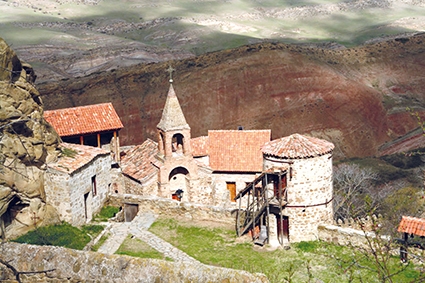Border Disputes – Georgian and Azeri Experts Work Towards Resolution
Expert groups from the Georgia-Azerbaijan Bilateral Border Delimitation Commission have begun surveying sections of the border between the two countries to resolve issues surrounding the state boundary, announced the Ministry of Foreign Affairs on Wednesday.
On 20 August, the experts visited Vakhtangisi village and the David Gareji Monastery Complex, situated along the border, where ‘They examined the positions of the two commissions and presented their vision on the sections in question,’ reads a statement released by the Ministry of Foreign Affairs. Both the Georgian and Azerbaijani experts clarified their opinions on the border which will be submitted to the co-chairs of the commissions.
The border between the two countries has been undefined since the mid-1990s. Following the collapse of the Soviet Union and conflicts in the Caucasus, Georgia and Azerbaijan have defined 66% of their boundaries, leaving 34% undefined.
The Bilateral Border Delimitation Commission was formed after the fall of the Soviet Union. However, at the time, Georgia prioritized internal conflicts such as in Ajara and border issues with Russia rather than bilateral border issues.
Over the past two decades, the undisputed borders have sparked tensions between border guards and locals. In April, clerics at the David Gareji monastery, listed on the UNESCO Tentative List of World Heritage, reported that Azeri border guards prevented them, as well as tourists and pilgrims, from entering the monastery. The ban was lifted after several days following negotiations.
The tensions further escalated in on June 14 when, according to clerics, Azerbaijani border guards removed icons from the monastery.
Meanwhile in July, Archimandrite Kirion announced that Azerbaijan border guards had erected a tent within the complex. “The number of Azerbaijani border guards has been doubled and tourists and clerics are still not allowed to enter the Udabno Monastery,” he noted.
Dating back to the 6th century, the David Gareji Monastery is dear to many Georgians who consider it to be part of the country’s cultural heritage. However, Azerbaijanis, who know the monastery as Keshikchi, also consider it to be an important part of their own culture. The site is listed as one of the seven most endangered heritage sites in Europe.
It is imperative that Georgia and Azerbaijan resolve their border disputes as some experts have warned that both Russia and Armenia could use them to their advantage.
The European Union has been encouraging Georgia and Azerbaijan to resolve their border disputes as part of its EU neighborhood policy, although little progress has yet been made.
The Bilateral Border Delimitation Committee will continue to survey the disputed border sections until 23 August. There is also a section stage of negotiations planned. In September, experts from both sides will meet in Tbilisi.
By Amy Jones
Image source: Georgia Tours











